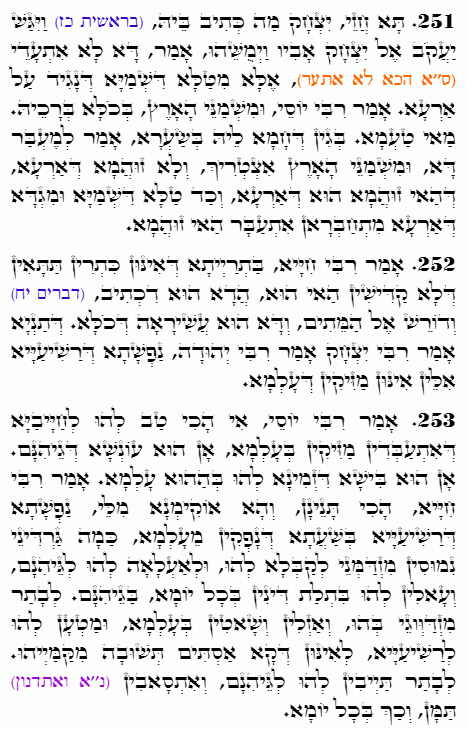Daily Zohar # 4660 – Acharei Mot – Wisdom from the fatness of the earth
Daily Zohar 4660

Hebrew translation:
252. אָמַר רַבִּי חִיָּיא, הָאַחֲרוֹן שֶׁל אוֹתָם הַכְּתָרִים הַתַּחְתּוֹנִים שֶׁאֵינָם קְדוֹשִׁים, זֶהוּ הוּא מַה שֶּׁכָּתוּב (דברים י) וְדוֹרֵשׁ אֶל הַמֵּתִים, וְזֶהוּ הָעֲשִׂירִי שֶׁל הַכֹּל. שֶׁלָּמַדְנוּ, אָמַר רַבִּי יִצְחָק אָמַר רַבִּי יְהוּדָה, נַפְשׁוֹת הָרְשָׁעִים אֵלּוּ הֵם מַזִּיקֵי הָעוֹלָם.
253. אָמַר רַבִּי יוֹסֵי, אִם כָּךְ טוֹב לָרְשָׁעִים שֶׁנַּעֲשִׂים מַזִּיקִים בָּעוֹלָם, אֵיפֹה הוּא עֹנֶשׁ הַגֵּיהִנֹּם? אֵיפֹה הָרָע שֶׁעָתִיד לָהֶם בָּעוֹלָם הַהוּא? אָמַר רַבִּי חִיָּיא, כָּךְ שָׁנִינוּ, וַהֲרֵי בֵּאַרְנוּ אֶת הַדְּבָרִים. נַפְשׁוֹת הָרְשָׁעִים בְּשָׁעָה שֶׁיּוֹצְאִים מִן הָעוֹלָם, כַּמָּה שׁוֹמְרֵי ְהַחֻקִּים מִזְדַּמְּנִים כְּנֶגְדָּם וּלְהַכְנִיסָם בַּגֵּיהִנֹּם, וּמַכְנִיסִים אוֹתָם בִּשְׁלֹשָׁה דִינִים בְּכָל יוֹם בַּגֵּיהִנֹּם. אַחַר כָּךְ מִזְדַּוְּגִים עִמָּם, וְהוֹלְכִים וּמְשׁוֹטְטִים בָּעוֹלָם, וּמַטְעִים אֶת הָרְשָׁעִים לְאוֹתָם שֶׁנִּסְתְּמָה מִלִּפְנֵיהֶם הַתְּשׁוּבָה. אַחַר כָּךְ מְשִׁיבִים אוֹתָם לַגֵּיהִנֹּם, וְנִטְמָאִים (וְנִדּוֹנִים) שָׁם, וְכָךְ בְּכָל יוֹם.
.
Zohar Acharei Mot
Continued from previous DZ
#251
Come and see, Isaac—what is written about him?
Genesis 27:22
“וַיִּגַּשׁ יַעֲקֹב אֶל יִצְחָק אָבִיו וַיְמֻשֵּׁהוּ וַיֹּאמֶר הַקֹּל קוֹל יַעֲקֹב וְהַיָּדַיִם יְדֵי עֵשָׂו.”
“So Jacob went near Isaac his father, and he felt him and said, “The voice is Jacob’s voice, but the hands are the hands of Esau.”
He said, “He is lacking nothing but the dew of the heavens (מִטַּל הַשָּׁמַיִם) flowing onto the earth.” This means that he only needs the nourishments from Zeir Anpin, which is referred to as “שָּׁמַיִם” “the heavens,” representing the light of Chassadim. Since Jacob is a Chariot for the middle line, Zeir Anpin, he doesn’t require the light of Chokmah, but his father, Isaac, blessed him with both Chassadim and Chokmah.
Rabbi Yossi added that it also says, “וּמִשְׁמַנֵּי הָאָרֶץ” “And from the fatness of the earth” (Genesis 27:28), which refers to the light of Chokmah. He blessed him with both Chessed and Chokmah. He blessed him with the light of Chokmah because Isaac saw Jacob’s hair, that has the aspect of judgments (dinim). Therefore, to remove this judgment from him, he needed the fatness of the earth, which is the light of Chokmah. However, it is not the impurity of the earth, like that of the Sitra Achra, that draws from the impurity of the nails (See #248 above). This impurity stems from the earth, which is Malchut. But when the dew of the heavens and the bounty of the earth, representing Zeir Anpin and Malchut, unite, the impurity is removed.
Notes:
Isaac senses judgment (the hair on Jacob’s hands), so he blesses him with the light of Chokmah (מִשְׁמַנֵּי הָאָרֶץ). This counterbalances and neutralizes the judgment, ensuring that Jacob receives the blessings in a way that purifies him, removing the negativity associated with the Sitra Achra. Joining Zeir Anpin and Malchut removes impurities and enhances the flow of blessing.
#252
Rabbi Chiya said: “The last of these lower sefirot that are not holy is referred to in the verse, ‘וְדוֹרֵשׁ אֶל הַמֵּתִים’ ‘or one who inquires of the dead’ (Deuteronomy 18:11). This is the tenth of all the sefirot, meaning the Malchut of the Sitra Achra. There are ten types of sorcery (כישופים) mentioned in Scripture, corresponding to the ten sefirot of the Sitra Achra (as explained in Vayishlach,#35). We have learned that Rabbi Yitzchak said in the name of Rabbi Yehuda: The souls of the wicked who have died—these are the harmful spirits of the world. It is about them that the verse refers when it says, ‘וְדוֹרֵשׁ אֶל הַמֵּתִים’ ‘or one who inquires of the dead.’
Notes:
Rabbi Yitzchak, quoting Rabbi Yehuda, explains that the souls of wicked individuals who have died become harmful spirits in the world. These spirits are the ones that those who “inquire of the dead” attempt to communicate with, engaging in forbidden practices that tap into impure spiritual levels.
#253
Rabbi Yossi said: “If so, it seems good for the wicked, as they become harmful forces in the world. Where, then, is the punishment of Gehennam (Hell)? Where is the pain prepared for them in the world to come?” Rabbi Chiya responded: “We have learned and established that the souls of the wicked when they leave this world, encounter several forces of judgment prepared to receive them and bring them into Gehennam. They are subjected to three forms of judgment in Gehenna every day. Afterward, they are attached to the destructive angels and wander the world, leading astray the wicked who have already closed off the possibility of repentance. Afterward, they are returned to Gehennam to be judged again. This happens every day.
Notes:
While it may appear that the wicked continue to have influence after death, their existence is one of continual punishment and torment, both in Gehennam and in their role as destructive forces (מלאכי חבלה) in the world. This cycle underscores the Zohar’s teaching on supernal justice, where even in death, the wicked cannot escape the consequences of their actions, and their suffering continues daily in a very real and profound way.
{||}

 Previous: Acharei Mot
Previous: Acharei Mot

